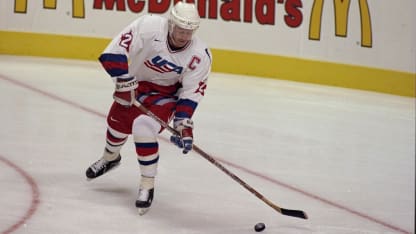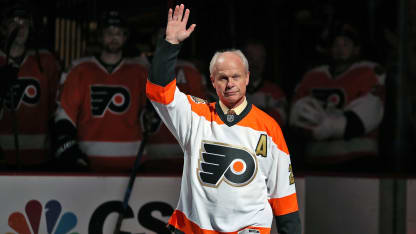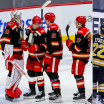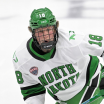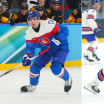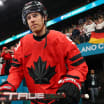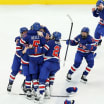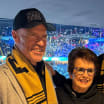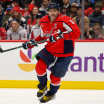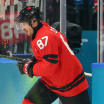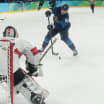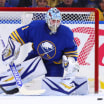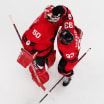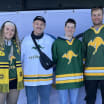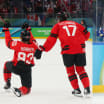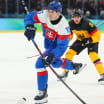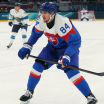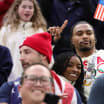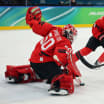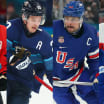All the honorees had unique memories of Philadelphia fans and the city as a hockey town.
The 1996 World Cup started with the United States playing Canada in the first major event at CoreStates Center.
"I can remember the first time we walked in they were still putting paint up," Mike Richter said.
He remembers hearing more than construction noises during their initial tour.
"The first day we're walking in, walking delicately around this beautiful locker room, and you hear this boom, boom, and laughing," Richter said. "[Keith] Tkachuk and [Bill] Guerin are doing high dives into the whirlpool.
"It was a perfect metaphor for that team. We worked really hard and we were really close. I laughed for three straight weeks with that group of idiots. It was so much fun."
The United States played three games in Philadelphia during the World Cup. It defeated Canada 5-3 in the first game of pool play, and in the semifinals won 3-2 in overtime against Sweden. In Game 1 against Canada at CoreStates Center, the United States lost 4-3 in overtime, but the players were able to draw energy from the fan support
"They were fantastic," said center Joel Otto, who played for the Flyers at the time. "We had great support from the Flyers standpoint all the time. … But when it's a patriotic game, you're playing for your country, it was quite exciting. I'm getting chills talking about it. You start to remember how much fun it was and the electricity that was in the building."
The United States won the next two games in Montreal, clinching the championship with a 5-2 win in Game 3.
Twenty years later, the closeness of the team is obvious in the way players easily slid back into old conversations.
"Life goes by fast," Richter said. "Everybody's got their own lives. It's nice to go back. The tightness of this team means everybody seems to be happy to see each other. There's nobody on that team you didn't want to sit and hang out with. We loved playing with each other on the ice, and then after meals you'd sit and laugh with everybody."
A number of the players were on hand to celebrate the event, as were coach Ron Wilson and assistant coach Paul Holmgren. Having the players, coaches and management staff inducted together is another sign of the group's closeness.
"It's cool," Leetch said. "All the guys, you can share it with each other, a night like this. All those teams that are successful for whatever level you're at, there's usually some bonding, some good chemistry, a good group of support there, everyone's in it together. To be remembered like that as part of that team is a lot of fun together."
Howe called the 10 seasons he played with the Flyers the best part of his NHL career.
"I've always been open and honest about the great time I had here," he said. "The respect I had for [owner] Ed Snider and the Snider family, and the philosophies of how this team was run and put together. [A] lot of that came from Ed and Bobby Clarke. It's all about team, nothing about individual. And the group of guys I played with here, especially through the mid-1980s, were as great a group of guys I ever played with.
"We were all for each other. I think we took a lot of pride in that we weren't the most talented team, but we competed hard together and competed for each other. Always took a lot of pride in that."
Janney played 15 NHL seasons for six teams but never the Flyers, so the memories of his visits to Philadelphia and games at the Spectrum, the Flyers' home prior to 1996, were a bit different.
"I remember we won in overtime one night [with the Boston Bruins] and we shouldn't have won the game," he said. "It was one of those games where we lucked out. Our goalie, Andy Moog, pulled it out for us, we scored a fluke overtime goal and we were all laughing going out.
"… We went out and the fans attacked our bus. They almost tipped it over they were so mad. What's good about the fans here is they're knowledgeable. They realized there's no way we should have won that hockey game. They vocally made sure we knew it."
Kelly was player-coach of the Jersey Devils of the Eastern Hockey League in 1964-65, based in the Philadelphia suburbs. He had, perhaps, the most unique memory of the region.
"In Cherry Hill, New Jersey, I got introduced to [traffic] circles," he said. "I had never been in a traffic circle before. I got in there one morning and it took me three times around before I could finally get over to get out. Never had them in Canada, never had them in any place I played hockey. I knew the next time I got in one I got in the right lane to get out."
